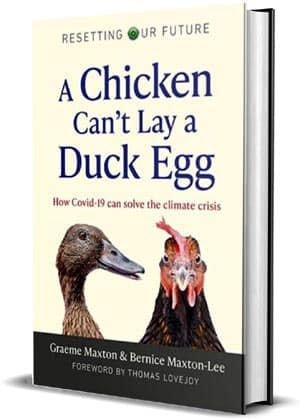Bernice Maxton-Lee is co-author, with Graeme Maxton, of Resetting Our Future: A Chicken Can’t Lay a Duck Egg (John Hunt Publishing, October 2021)
How often are we told that the market must be part of the solution to the climate crisis? The efficiency, the focus, the discipline embedded in the pursuit of profit, the refinement of responding to consumer demands, each of us maximizing our individual utility, those are the values that will get us all pulling in the same, sustainable direction.
We’re told the collaboration of business and society will be win-win: companies will make loads of money; we, the people, will get a planet to live on. Mark Carney, the former governor of the Bank of England, said “there will be great fortunes made” when businesses start doing “what society wants”.
Bloomberg admits that capitalism caused climate change, but says because vast sums of money will be needed to fund the transition to a sustainable global society, harnessing the power of the market is our best hope.
There’s just one problem with this narrative: experience, time after time, shows us another reality. Companies regularly lie to protect their profits. They conceal important information to protect their reputations. The dodge and weave to avoid following rules of propriety. They produce goods that are dangerous. There are countless examples. Let’s look at two: Boeing, and Exxon.
Boeing makes aircraft. Perhaps the most important feature of an aircraft, apart from its ability to leave the ground, is its ability to not fall out of the sky. But Boeing was so keen to sell its new 737 Max that it repeatedly overlooked this feature. A recent report from the US House of Representatives transport and infrastructure committee found that Boeing knew that a faulty sensor would cause on-board software to force the plane’s nose down. To save money, the company rejected efforts to make extra training compulsory for Max 737 pilots.
A Boeing test pilot discovered the fatal sensor flaw in a 737 simulator, describing the problem as ‘catastrophic’. Boeing concealed the information from the Federal Aviation Authority, from customers, and from 737 pilots. Workers at the Boeing plant were routinely overworked, to the point where safety was compromised. All this, in the pursuit of profit. When two Max 737s crashed, in 2018 and 2019, Boeing concealed all it knew, and tried to blame the crashes on pilot error.
Is this the kind of behavior that will enable a transition to a sustainable future for global society?
Then there’s Big Oil. In September 2020, a lawsuit was filed against ExxonMobil, for deliberately deceiving the public about the connection between fossil fuels and the climate crisis. Like the other major oil companies, Exxon has known for decades that hydrocarbon combustion is causing climate change. Not only did they conceal that knowledge, they also funded a powerful campaign of climate denial, which continues to confuse action of climate change today, lending credence to climate deniers at the highest levels.
Exxon is a member of the Independent Petroleum Association of America (IPAA), an oil and gas industry trade association, which circulates articles attacking climate scientists, advocates, journalists, and lawyers, including a smear on the law suit just launched against Exxon for climate denial.
Are these the values that will help a transition to a sustainable, carbon-free future?
Bloomberg’s argument that the bottomless money pit of capitalism is the only logical way to fund the transition to decarbonize the global economy ignores where the money comes from.
Money is made from extracting resources without paying for the damage caused to nature or future generations.
Money comes from processing and transforming resources (using cheap fossil energy) into goods that can be sold.
Money comes from speculating on commodities, driving land-use change.
Money comes from tech companies, making silicone chips using vast amounts of water and energy, which go into computers and cell phones, which are designed to become obsolete within a few months, so they can be replaced with new models.
None of the vast sums of money Bloomberg assumes will fund a carbon transition, are themselves carbon-free. And why would hedge funds, mining companies and tech firms spend their profits on sterilizing their golden goose?
The pursuit of profit certainly made these companies efficient, but not in the way global society needs. Pursuit of profit is the reason hundreds of people died, needlessly, in those jets. Pursuit of profit is the reason oil companies have lied about climate science for decades, continuing to pump CO2 into the atmosphere. The free market cannot be part of the solution: it is the problem.




My only comment is to observe that ‘Boeing’ didn’t conceal information and try to blame pilot error and ‘Exxon’ didn’t conceal information and fund climate denial. Companies don’t have agency. Individuals have agency. It was individuals – board members, executives, possibly lawyers and insurers – who made and executed the decisions to conceal, blame and fund. Not for a moment am I trying to excuse corporations or disagree with anything written above, I’d just like us to always remember that individuals who know exactly what they are doing are responsible for these destructive acts. We shouldn’t let them hide behind company names.